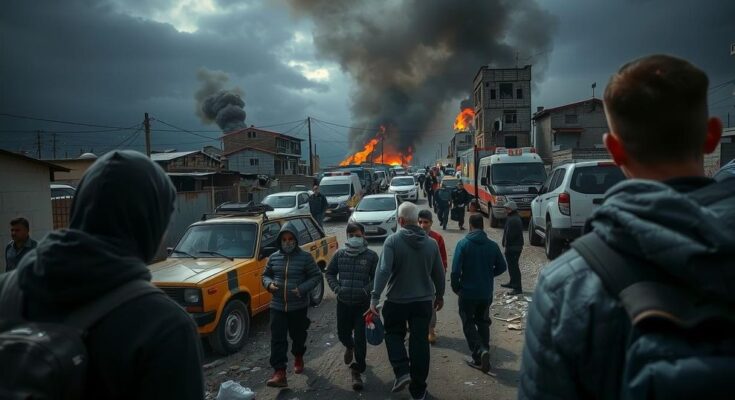The Gaza conflict has exceeded 379 days, with Israeli forces conducting severe assaults resulting in widespread civilian casualties, including women and children. The death toll has surpassed 42,000, as international leaders call for a ceasefire. Simultaneously, tensions escalate in Lebanon with active engagement from Hezbollah against Israeli targets, complicating the situation further.
The ongoing conflict in Gaza has now surpassed 379 days, marked by relentless Israeli military actions that continue to target civilian populations. A recent airstrike on the Jabalia refugee camp has led to significant casualties, with numerous women and children among the victims. The Israeli defense forces have reinforced their presence in northern Gaza, specifically in Jabalia, deploying the Givati Brigade alongside the 162nd Division, suggesting a potential increase in military engagement. The Palestinian Ministry of Health has reported three additional massacres over a 24-hour period, resulting in 19 fatalities and 91 injuries, raising the total death toll since October 7, 2023, to a staggering 42,519, with over 99,637 people wounded. Communications in northern Gaza have been disrupted, which Hamas claims is an effort to isolate and displace the local population while obscuring the atrocities committed by Israeli forces. As tens of thousands of Palestinians remain trapped in their homes in Jabalia, they are unwilling to heed Israeli evacuation directives amidst ongoing ground assaults. The assassination of Hamas leader Yahya Sinwar has been publicly acknowledged, yet international calls for a ceasefire persist. Leaders from the United States, France, Germany, and the United Kingdom recently convened in Berlin, expressing a unified stance for an end to the hostilities and for hostages to be returned promptly, alongside ensuring humanitarian aid access to civilians. UN independent investigator Michael Fakhri has asserted that Israel continues to conduct a campaign of starvation in Gaza, despite the delivery of humanitarian aid, including food. Reports of military engagement continue to surface, including actions by Al-Quds Brigades and Qassam Brigades targeting Israeli military assets. In a related context, tensions have escalated in Lebanon, where Israeli forces have intercepted drones launched from Lebanese territory, and Hezbollah has actively engaged by shelling northern Israeli cities. The Israeli military maintains pressure on southern Lebanon, marking a shift in the confrontation dynamics. Lebanese Prime Minister Najib Mikati emphasized the urgency of a ceasefire and reiterated Lebanon’s commitment to international resolutions amid ongoing violence against civilians and UN forces.
The current situation in Gaza and Lebanon is a continuation of a protracted conflict characterized by military engagements, humanitarian crises, and international diplomatic efforts aimed at resolving hostilities. The Israel-Palestine conflict has been ongoing for decades, with periods of heightened violence often leading to devastating consequences for civilian populations, particularly in Gaza. The recent escalation has seen various Palestinian factions, such as Hamas and Islamic Jihad, engage militarily, while the Israeli government positions itself as responding to threats. International leaders play a role in attempting to mediate and address the humanitarian implications of the conflict, as evidenced by recent calls for ceasefires and aid access.
In summary, the conflict in Gaza remains intense, marked by significant civilian casualties, international diplomatic efforts to halt hostilities, and ongoing military operations by Israeli forces. The humanitarian crisis continues to deepen, drawing attention from global leaders and organizations regarding the protection of civilians and the need for a ceasefire. Furthermore, the situation in Lebanon adds another layer of complexity to regional tensions, with Hezbollah’s activities and Israeli responses further heightening the stakes in this volatile environment.
Original Source: www.dailynewsegypt.com




